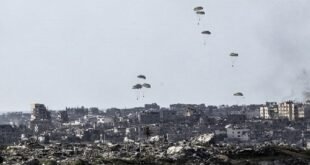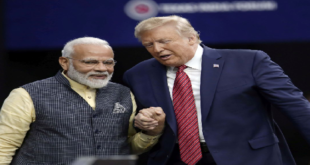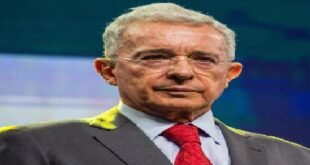17-07-2022
TEHRAN: The Iranian government has blacklisted United States officials over their backing of a group that Tehran considers to be a “terrorist” organization.
 The Iranian foreign ministry on Saturday published a list of 61 current and former American officials who it said have provided “deliberate support” to the Mujahideen-e Khalq (MEK), a group that openly calls for overthrowing the current Iranian establishment.
The Iranian foreign ministry on Saturday published a list of 61 current and former American officials who it said have provided “deliberate support” to the Mujahideen-e Khalq (MEK), a group that openly calls for overthrowing the current Iranian establishment.
Several of the individuals, including former Secretary of State Mike Pompeo, were previously blacklisted by the Iranian government for other reasons.
House Minority Leader Kevin McCarthy, Senators Ted Cruz and Cory Booker, and former National Security Adviser Lincoln Bloomfield were among the sanctioned individuals.
The individuals provided support to the group by participating in its events and “offering political and propaganda support”, the Iranian foreign ministry said.
The Iranian establishment believes the MEK has killed more than 17,000 Iranian people across decades, many of them women and children.
The MEK was among groups that supported Iran’s Islamic Revolution of 1979 that deposed dynastic rule, but it later became one of the main opponents of the clerical establishment and resorted to violence to thwart it.
 The group has claimed responsibility for numerous assassinations and bombings in the early years following the revolution. It also aided Saddam Hussein in his eight-year invasion of Iran in the 1980s, and took up arms during the war.
The group has claimed responsibility for numerous assassinations and bombings in the early years following the revolution. It also aided Saddam Hussein in his eight-year invasion of Iran in the 1980s, and took up arms during the war.
The MEK was also listed as a “terrorist” organization by the US and European Union, but was delisted more than 10 years ago after it promised to abandon violent operations.
Since then, US officials, especially Republicans openly in favor of changing the establishment in Iran, have regularly attended MEK rallies and expressed their support.
The group has also held rallies and is based across several European nations including France, Sweden and Albania, causing Iranian officials to accuse those counties of harbouring “terrorists”.
Iran first started imposing sanctions on US officials in 2021. Among others, it blacklisted former President Donald Trump and Pompeo for their role in ordering and carrying out the assassination of its top general, Qassem Soleimani.
It then expanded that list in January, followed by more sanctions in April over charges of supporting “terrorism” and violations of human rights of the Iranian people through unilateral sanctions.
 The sanctions are thought to be largely symbolic since the individuals are not believed to have assets or interests in Iran and do not travel to the country.
The sanctions are thought to be largely symbolic since the individuals are not believed to have assets or interests in Iran and do not travel to the country.
As efforts to restore Iran’s 2015 nuclear deal with world powers have stalled, the US has also continued to level sanctions to further strain Iran’s economy.
The US unilaterally abandoned the nuclear deal under Trump in 2018 and imposed harsh, comprehensive sanctions that President Joe Biden has continued to enforce.
Earlier, Iranian President Ebrahim Raisi said Iran will have a “harsh and regrettable response” to any “mistake” committed by Washington or its allies.
The Iranian president spoke as US President Joe Biden and Israeli Prime Minister Yair Lapid signed a joint pledge on Thursday to deny Iran nuclear arms, a show of unity by allies long divided over diplomacy with Tehran.
Raisi blamed the US and “its regional allies” for stoking instability in the region, state-run IRNA news agency reported.
“The great nation of Iran will not accept any insecurity or crisis in the region and Washington and its allies should know that any mistake will be met by a harsh and regrettable response from Iran,” Raisi said during a speech, according to sources.
 The joint pledge signed on Thursday commits the United States to “never to allow Iran to acquire a nuclear weapon”, stating that it “is prepared to use all elements of its national power to ensure that outcome”.
The joint pledge signed on Thursday commits the United States to “never to allow Iran to acquire a nuclear weapon”, stating that it “is prepared to use all elements of its national power to ensure that outcome”.
Washington and Israel have long expressed concerns about Iran’s nuclear capabilities. Iran has insisted that it never had any ambition to make a nuclear bomb.
Israel, which has the region’s sole but undeclared nuclear arsenal, is staunchly opposed to any deal with Iran on its nuclear program, which Tehran says is for peaceful purposes.
Lapid warned that “words” and “diplomacy” were not enough to thwart Iran’s alleged nuclear ambitions.
“The only thing that will stop Iran is knowing that if they continue to develop their nuclear program, the free world will use force,” he said.
A landmark deal that imposed curbs on Iran’s suspect nuclear program in exchange for sanctions relief was torpedoed in 2018 by former US President Donald Trump. (Int’l News Desk)
 Pressmediaofindia
Pressmediaofindia




